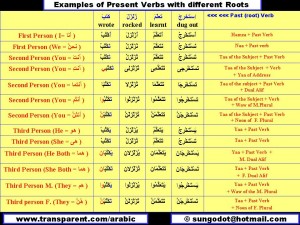Verb Tense: (2) Present المضارع Posted by Fisal on Apr 23, 2011 in Arabic Language, Grammar, Vocabulary
- We spoke earlier about the past tense of Arabic verbs and learnt that the root verb is always in the past tense. We also learnt the types of root verbs according to their minimum number of letters. Today, we are going to speak about the present tense and how to conjugate it from the past (root).
- A present tense refers to an unfinished action.
- We said earlier that the form of the verb depends on which tense it is. So, to get the present tense, we simply add one of the present tense letters to the beginning of the past (root) verb.
The Present Tense Letters (Prefixes) are :
* The Hamza (أ ) referring to the first person singular (أنا ).
* The Noon (نـ ) referring to the first person plural (نحن ).
* The Taa ( تـ ) referring to the person addressed (you أنت ) in all genders and numbers.
* The Yaa (يـ ) referring to the third person masculine singular, dual and plural; (هو / هما / هم )
* The Taa (تـ ) referring to the third person feminine singular, dual and plural; ( هى / هما / هنَّ )
Since a verb must agree with its subject in both number and gender, so the shape of present tense verbs looks as follows:
|
Examples of Present Tense Verbs with different roots |
|||||
|
|
كتبَ
wrote |
زَلْزَلَ
rocked |
تعلّمَ
learnt |
اِستخرجَ
dug out |
<<<< Past (root) Verb |
|
First Person ( I= أنا ) |
أَكْتُبُ | أُزَلْزِلَ | أَتَعَلَّمُ | أَسْتَخْرِجُُ |
Hamza + Past Verb |
|
First Person (We = نحنُ ) |
نَكْتُبُ | نُزَلْزِلُ | نَتَعَلَّمُ | نَسْتَخْرِجُ |
Naa’ + Past verb |
|
Second Person (You = أنتَ ) |
تَكْتُبُ | تُزَلْزِلُ | تَتَعَلَّمُ | تَسْتَخْرِجُ |
Taa of the Subject + Past Verb |
|
Second Person (You = أنتِ ) |
تَكتُبِي | تُزَلْزِلِى | تَتَعَلَّمِى | تَسْتَخْرِجِى |
Taa of the Subject + Verb + Yaa of address |
|
Second Person (You = أنتما ) |
تَكْتُبَا | تُزَلْزِلا | تَتَعَلَّمَا | تَسُتَخْرِجَا |
Taa of the subject + Past Verb + Dual Alif |
|
Second Person (You = أنتُم ) |
تَكْتُبُوا | تُزَلْزِلُوا | تَتَعَلَّمُوا | تَسْتَخْرِجُوا |
Taa of the Subject + Verb + Waw of M.Plural |
|
Second Person (You = أنتُنَّ ) |
تَكْتُبْنَّ | تُزَلْزِلْنَّ | تَتَعَلَّمْنَّ | تَسْتَخْرِجْنَّ |
Taa of the Subject + Past Verb + Noon of F. Plural |
|
Third Person (He = هو ) |
يَكْتُبْ | يُزَلْزِلُ | يَتَعَلَّمُ | يَسْتَخْرِجُ |
Yaa + Past Verb |
|
Third Person (She = هى ) |
تَكْتُبُ | تُزَلْزِلُ | تَتَعَلَّمُ | تَسْتَخْرِجُ |
Taa + Past Verb |
|
Third Person (He Both = هما ) |
يَكْتُبَان | يُزَلْزِلان | يَتَعَلَّمَان | يَسْتَخْرِجَان |
Yaa + Past Verb + M. Dual Alif |
|
Third Person (She Both = هما ) |
تَكْتُبَان | تُزَلْزِلان | تَتَعَلَّمَان | تَسْتَخْرِجَان |
Taa + Past Verb + F. Dual Alif |
|
Third Person (They = هم ) |
يَكْتُبُوا | يُزَلْزِلُوا | يَتَعَلَّمُوا | يَستَخْرِجُوا |
Yaa + Past Verb + Waw of the M. Plural |
|
Third person (They = هُنَّ ) |
تَكْتُبْنَّ | تُزَلْزِلْنَّ | تَتَعَلَّمْنَّ | تَسْتَخْرِجْنَّ |
Taa + Past Verb + Noon of F. Plural |
(Note1 : Arabic is a highly inflectional language. The above present verbs in the table by themselves have their own visible subject as a pronoun suffix attached to the end of the verb; e.g. تَكْتُبَا = You both write / يَكتُبوا = They (M.) write. Or the subject pronoun is invisible and understood from context; e.g. أَكْتُبُ = I write / أَتَعَلّمُ = I learn / نَكْتُبُ = We write / نَتَعَلَّمُ = We learn. Also, The gender of the person is understood from the present tense letters or prefixes attached to the beginning of the verb like the Hamza referring to (I = أنا ).
(Note 2: Future tense is derived from the present tense simply by adding the prefix (سـَ ) or the particle (سوف ) before the verb in the present form; e.g. سأكتُبْ / سوفَ أكتُبْ = I will write.)
(Note 3: Healthy and unhealthy verb tenses will be discussed later.)
Next time, we will continue looking at Imperatives

Build vocabulary, practice pronunciation, and more with Transparent Language Online. Available anytime, anywhere, on any device.
About the Author: Fisal
Well, I was born near the city of Rasheed or Rosetta, Egypt. Yes, the city where the Rosetta Stone was discovered. It is a small city on the north of Egypt where the Nile meets the Mediterranean. I am a Teacher of EFL.




